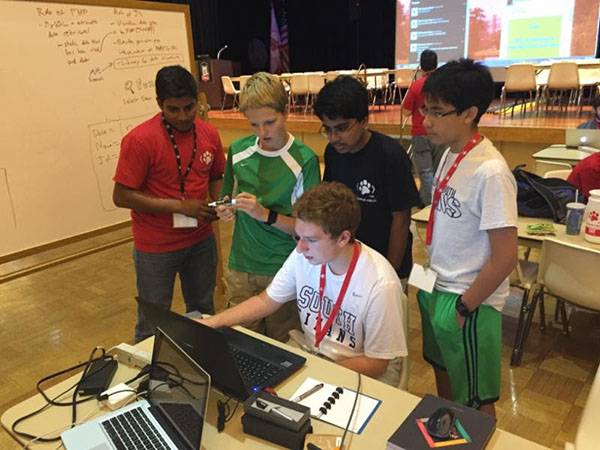Freshmen compete in coding competition, create original website

BRO CODE: Collaborating in website creation, freshmen Nicholas Ermolov, Ahmed Malik, Jesus Crespo and Matt Moran (seated) receive instruction from a coding expert. The boys coded for a full 24 hours and learned valuable skills along the way. Photo courtesy of Mike Sinde
November 6, 2015
A team of four GBS freshmen, Nicholas Ermolov, Ahmed Malik, Jesus Crespo and Matt Moran, took first place at the first Northern Illinois University Huskie Hack, a coding competition that was held in September.
According to the competition’s website, the event ran from noon on Sept. 25 until noon the next day. The challenge was to quickly create a website that would easily display census data in a visually appealing manner.
“This event was a new experience for all of us,” Malik said. “We all have coded before, but it was new [because] we had to undertake a task that [required] us to use all of our different skills.”
According to Malik, The group did not know anything about the challenge until it was given to them at noon.
“The challenge [didn’t] give many specifics on what to do, which was good, because that opened up a lot of possibilities,” Malik said. “But, it also made it hard to understand what we needed to do. We didn’t realize until two to three hours into the competition that we had to use Illinois census data, not nation-wide data.”
Experts in computer fields offered advice to group during the competition. According to Malik, a difficult part of the challenge was being unable to ask the sponsors for help after the first half of the competition.
“They left after a while, which was stressful,” Malik said. “But it gave us a real-life experience, and [we were able to experience] how it would [feel] in a company environment [with no help].”
Moran adds that once the group got into the swing of things, it was easy to adjust to the challenge.
“Once I have my mind set on something, I can work on that forever,” Moran said.
PLTW teacher Michael Sinde, commented that not everyone can adapt to such a challenge as this group did.
“These kids have incredible work ethic,” Sinde said. “I think that [is] owed to their success.”
The end-product of the challenge was a website called Cimple Census, which was effective at compiling census data. While some members worked on the actual website, others focused on the background coding and algorithms.
“We had a very diverse group,” Moran said. “Nicholas Ermolov has a lot of experience working on web development, so he worked on the ‘back-end,’ or the mathematics, of the app. I worked on the front-end.”
Moran went on to say that, through the different talents of each group member, they were able to accomplish this task. Crespo adds that some were fluent in different languages, so they ended up splitting into teams of two. In the future, the team hopes to work together in other competitions.


